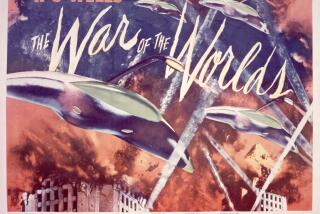WHALE NATION : <i> by Heathcote Williams (Harmony / Crown: $25) </i>
- Share via
From where we stand, the ocean appears to be merely a gap between land, no more significant than the empty area between atoms or planets. From space, however, it is the land that appears insignificant, for from space, as playwright Heathcote Williams points out in this extraordinary poem, the planet is blue. Williams issues this humbling reminder in part to discourage us from destroying oceanic life, but “Whale Nation” has a deeper meaning: As our pockets of land--three-tenths of the Earth--become increasingly troubled by wars, poverty, dwindling resources and other environmental problems, Williams suggests that we look to the still-harmonious ecosystem of the sea for inspiration.
Williams singles out whales because they are grand in size and spirit, living a life many of us dream about: weightless, social, sensual, non-manipulative (using language to communicate rather than to eliminate rivals) and carefree (they play for three times as long as they spend searching for food).
Readers of this poem will be tempted to conclude that whales are also the smartest of Earth’s creatures, mostly because of Williams’ seductive melange of words and pictures, but also because there is enough hard evidence to keep us wondering: Like man, whales have large parietal and frontal lobes for abstract thought. Their ability can be heard in whale song, the mysterious, ethereal music passed on from generation to generation and profuse with data; “An Odyssey, as information-packed as Homer’s,” the author claims, “can be told in 30 minutes of song,” and yet lone Humpbacks often have enough material to put on a solo concert lasting for days.
Contrasting idyllic nature with imperfect man has become commonplace in the 20th Century, of course, and “Whale Nation” is guilty of some of this: The comparison between man and whales is specious, for one, because whales don’t have to compete for scarce resources. But Williams inspires more often than he scolds, pointing to our common heritage (X-rays show the whales’ eerily human arms and hands, remnants of their days as land-based mammals) and reminding us of our shared destiny: If whales which eat oxygen-producing plankton are hunted to extinction, Williams writes, the plankton would breed uncontrollably, destroying the Earth’s “air-conditioned equilibrium,” and with it, both whale and man.
More to Read
Sign up for The Wild
We’ll help you find the best places to hike, bike and run, as well as the perfect silent spots for meditation and yoga.
You may occasionally receive promotional content from the Los Angeles Times.






